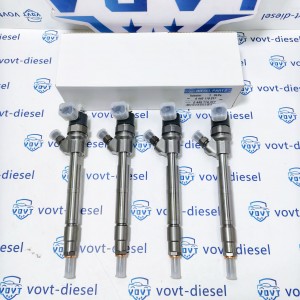Professional Manufacture 0 445 120 730 Diesel Injector Common Rail Injector Engine Parts Vehicle Parts 0445120730
products description
| Reference. Codes | 0 445 120 730 |
| Application | / |
| MOQ | 4PCS |
| Certification | ISO9001 |
| Place of Origin | China |
| Packaging | Neutral packing |
| Quality Control | 100% tested before shipment |
| Lead time | 7~10 working days |
| Payment | T/T, L/C, Paypal, Western Union, MoneyGram or as your requirement |
Effects of Methanol–Gasoline Blended Fuels on Injector Sealing Performance and Improvement Measures
The increasing use of methanol–gasoline blended fuels in modern spark-ignition engines provides a promising pathway toward low-carbon transportation. However, the strong polarity, high oxygen content, and corrosive characteristics of methanol introduce new challenges to the sealing performance of fuel injectors. Since injector sealing integrity directly affects injection quantity, spray stability, and engine reliability, understanding the influence of methanol blends and developing effective improvement measures are essential.
Methanol-containing fuels alter the physicochemical environment in which injector components operate. Compared with pure gasoline, methanol exhibits higher hygroscopicity and stronger solvency, which accelerate material swelling, softening, and chemical degradation of conventional sealing elements such as fluororubber or nitrile rubber. Even metallic components, including the needle–seat interface and nozzle orifices, can experience corrosion due to methanol-induced oxidation and the presence of absorbed water. As the sealing surfaces degrade, micro-gaps expand, leading to internal leakage, inconsistent injection pressure buildup, and spray drift during long-term operation.
Furthermore, methanol–gasoline blends have lower lubricity than traditional gasoline, increasing friction and wear at the needle guide and seat region. The combination of chemical swelling and mechanical wear accelerates fatigue crack initiation, especially under high-frequency injection cycles. CFD–fluid–structure interaction analyses suggest that methanol-rich fuels create sharper pressure fluctuations within the needle chamber, amplifying dynamic loading on sealing interfaces. This may cause delayed needle closure, reduced sealing force, and fuel dribble after injection—conditions that negatively affect combustion stability and emission levels.
To address these challenges, several improvement strategies are recommended. First, advanced sealing materials such as FKM with enhanced methanol resistance, fluorosilicone rubber, or perfluoroelastomers (FFKM) can significantly improve chemical durability. Second, applying protective coatings including DLC, CrN, TiN, or ceramic nano-coatings on metallic sealing surfaces enhances corrosion resistance and reduces frictional wear. Third, optimizing the seat geometry and improving needle–seat conformity help maintain uniform contact pressure and compensate for small deformations caused by chemical swelling. Additionally, incorporating micro-textured surfaces at the sealing contact region can improve lubrication retention while maintaining tight sealing.
From a system perspective, fuel conditioning and filtration are also crucial. Removing water content from methanol–gasoline blends reduces corrosion risk and prevents seal degradation. Adaptive injection control strategies—such as adjusting needle lift, energizing time, and pressure buildup profiles—can further mitigate the sensitivity of the injector to fuel property variations.
In conclusion, methanol–gasoline blends impose combined chemical, mechanical, and tribological stresses on injector sealing components. By integrating advanced sealing materials, protective surface treatments, optimized structural design, and adaptive control strategies, the negative impacts can be effectively reduced. These findings offer valuable guidance for developing methanol-compatible injectors that ensure long-term sealing integrity and reliable engine performance.
Related products
| 1 | 5WS40200 | 11 | A2C59514909/ | 21 | 31336585 |
| 2 | FA2C53252642 | 12 | A2C59511602 | 22 | 36001726 |
| 3 | 1685796 | 13 | A2C59513556 | 23 | 1709667 |
| 4 | 31303994 | 14 | 5ws40677 | 24 | 36001727 |
| 5 | 50274V05 | 15 | 50274V0 | 25 | 9445R |
| 6 | 5WS40087 | 16 | 5WS40677 | 26 | 00Q1T |
| 7 | 16600-00Q1T | 17 | AV6Q9F593-AB | 27 | 5WS40007 |
| 8 | 00Q0H | 18 | AV6Q9F593-AA | 28 | A2C59513997 |
| 9 | 5WS40148-Z | 19 | A2C59511606 | 29 | 5WS40250 |
| 10 | 2S6Q-9F593-AB | 20 | 16600-00Q0P | 30 | A2C59514912 |



















